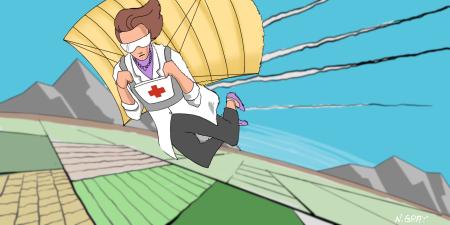Abstract
Short-term experiences in global health (STEGHs) are common ways trainees engage in global health activities, which can be viewed by students as either altruistic or opportunistic. This article explores how STEGHs express the social contract medicine has with society, emphasizes areas of breakdown in this social contract, and calls for medical schools, licensure boards, STEGH-sponsoring organizations, and professional societies to take active roles in addressing these ethical challenges.
International Health Experiences
Global health has been defined by Koplan et al as an “area for study, research, and practice that places a priority on improving health and achieving equity in health for all people worldwide.”1 A common practice in this field is for health professions students, trainees, and professionals to undertake short-term experiences in global health (STEGHs). STEGHs are varied and include clinical activities, research, capacity building, and public health practice. By 2004, 22% of graduating US medical students had had international health experiences.2 Based on data from 1996 to 2015, 9% to 83% of US residency programs (depending on specialty) have offered global health training.3 Available data overwhelmingly support that STEGHs are beneficial for students and trainees, as they are associated with these groups’ increased levels of idealism, cultural competence, social responsibility, and service to the underserved.4
However, these benefits can come at a cost to the host communities. Although a common motive for participation in STEGHs is the desire to help in an underserved setting,5 this desire and obligation to be helpful—and the false confidence conferred on students and trainees by their presumed capability6—underlies many of the ethical challenges of STEGHs. In addition, there is evidence that prehealth students view STEGHs as an opportunity to get hands-on clinical experience not allowed in the United States due to legal, ethical, and safety considerations.7 Students seek these experiences in part to augment their applications to medical and other health professions schools,8 despite concerns about patient harm.9,10,11
Multiple standards and guidelines have been developed to emphasize that STEGHs should have an educational focus with appropriately scoped and supervised service.12,13,14 Some have argued that hands-on clinical care with visiting trainees serving as clinicians is never an appropriate component of STEGHs.15 Here, we examine the ethical challenges associated with STEGHs through the lens of the social contract between society and medical education. We argue that the social contract requires medical education institutions to take an intentional approach to STEGHs for premedical and undergraduate medical students as well as residents.
Social Contract and International Education
Medicine and society can be said to have a social contract, an idea derived from political science.16 The contract refers to the expectations that society has of physicians to be competent, ethical, and responsive to the health needs of society17 in return for what society provides physicians, ie, “status, respect, autonomy in practice, the privilege of self-regulation, and financial rewards.”18 While the social contract in medicine is multifaceted and mostly implicit,18 one of its aspects is particularly relevant to medical education: the expectation of clinical competence. This expectation manifests as the obligation of medical professionals to maintain competence in their chosen fields and to ensure appropriate discipline of incompetent, unprofessional, or unethical practitioners through self-regulation. Implicit in the expectation of competence is that training constitutes society’s investment in future professionals.
Unfortunately, the social contract’s expectation of competence can have negative impacts on patients, who may experience inefficiencies, inconveniences, and risks due to interactions with students and trainees.19,20 Inefficiencies and inconveniences are due in part to the necessary redundancies that result from oversight of trainee activities by a licensed physician.20 Society—and patients themselves, through informed consent—accept these costs to ensure a supply of physicians and other health professionals who are inculcated with a sense of professionalism.21
Breakdown During International Education
The social contract in medicine functions when society is relatively well organized and when both society and the medical profession share the same values and structures.22 While particular aspects of the social contract related to societal expectations of medicine—including altruistic service and promotion of public good—are ostensibly the reason for the creation of STEGHs,18 other aspects of the social contract, such as competence and accountability, may not be consistently satisfied in such experiences.
Competence. Although guidelines for international health-related experiences from the Forum on Education Abroad recommend that student interaction with the patient and community not exceed what would be permitted in the United States,23 in STEGHs students may be put in positions that compromise the safety and well-being of the patient and student, which raises significant ethical and legal concerns.10,11,24 While medical volunteers’ desire to “help” seems consistent with universal values and instincts,25,26 rarely is there any assurance of competence.
Accountability. In the absence of any worldwide medical credentialing, licensure, and oversight system, a clear localization of the society that is a party to the social contract is essential. At its core, the social contract aims to ensure a steady supply of appropriately equipped, vetted, and credentialed physicians in the society where students train. In a majority of STEGHs, however, the society that assumes the risk and inconvenience involved in training will not benefit from students’ future service as health professionals. Thus, the social contract should be considered geocentric, as the society that bears the burden of training the students should also benefit when the students become physicians.
Promoting public good. Clinical care in settings outside of one’s home country may be significantly different depending on the cultural and social determinants of health, languages spoken, clinical protocols, and health system realities that depend on political and economic conditions. These aspects can contribute to misalignment of STEGHs’ operation and mission in the host country. One of the primary concerns is the lack of real partnership between local health care practitioners and volunteers.13 Besides reinforcing negative stereotypes of communities and local health care practitioners, inadequate or nonexistent collaboration contributes to active undermining of local health care systems.9,27,28 Consideration of potential benefits and harms is of particular importance in providing care in communities that lack resources, as STEGH resources might be used in more effective and culturally responsive ways if they were applied in an existing health care system.4 Indeed, human resources for health (HRH) strategies and plans exist at the country, regional, and global levels, but none propose that medical students from high-income countries (HICs) undertake clinical electives as the solution to health disparities or HRH shortages.29 No research we are aware of suggests that international trainees completing rotations can effectively or appropriately supplant low- and middle-income countries’ (LMICs’) local health care workforce. Thus, institutions that are facilitating these activities in both HICs and LMICs need to be realistic about the role of trainees and to recognize that adequately supervising them diverts human resources from providing care.12,14
Institutions’ Responsibilities
The responsibility of ensuring that the social contract between medicine and society is honored rests with the institutions of sending countries—in particular, medical schools, residency and fellowship programs, state medical licensure boards, STEGH sponsoring organizations, and professional societies.
Professional self-regulation, as a part of the social contract, is ensured by appropriate licensure and discipline. From a legal perspective, for example, no student or health professional should be practicing or teaching in another country without an appropriate contractual agreement or the equivalent. Health professionals or trainees are required to adhere to their licensed scope of practice, just as students are not permitted to perform any activities they would not be able to perform at home without sufficient and proper oversight.23,30 Although the purview of state medical licensing boards does not extend beyond a state’s borders, boards and professional societies should set clear expectations of legal and ethical boundaries for those participating in STEGHs.
Medical institutions must also honor the social contract. Medical school admission processes encourage applicants to have had meaningful exposure to clinical experiences, and many students use STEGHs as a way to attain this exposure. In the absence of global regulations or enforcement mechanisms governing supervision of students, medical schools should ensure that safe opportunities exist for medical students to participate in global health learning opportunities that are congruent with their skills and supported in an ethical manner. From a safety and ethical viewpoint, it also behooves medical schools to clearly define graduates’ level of global health training. To ensure compliance, this stipulation could be enforced through medical school accreditation requirements. While exposure to global health undoubtedly informs and augments the education of medical students, from an educational and ethical perspective, it is imperative to de-emphasize the primacy of clinical experiences as a mechanism to learn the essential tenets of global health.25 Medical schools should instead highlight the importance of nonclinical and health systems-based learning in international settings. This approach would enable future physicians to be responsive to the health needs of the society in which they intend to practice—an essential tenet of the social contract.
Conclusion
Despite the best intentions of stakeholders, STEGHs present significant ethical and legal challenges and might inadvertently undermine the development of professional values among volunteers and further exacerbate health disparities between sponsoring and host communities. A key aspect of meeting these challenges, as we have discussed, is the difficulties in applying the social contract to varied countries and communities. More research on this topic, along with concrete solutions from key national and international entities, is desirable. There are large variations from one STEGH to another, and too much responsibility is left in the hands of STEGH sponsors, the host community, and the volunteers themselves. It is within this regulatory vacuum that clinical and ethical lapses are practically guaranteed to occur; without any regulatory action, these lapses will continue unabated, and experiences in global health will ultimately not ameliorate worldwide disparities in health.
References
-
Koplan JP, Bond TC, Merson MH, et al; Consortium of Universities for Global Health Executive Board. Towards a common definition of global health. Lancet. 2009;373(9679):1993-1995.
- Drain PK, Primack A, Hunt DD, Fawzi WW, Holmes KK, Gardner P. Global health in medical education: a call for more training and opportunities. Acad Med. 2007;82(3):226-230.
-
Hau DK, Smart LR, DiPace JI, Peck RN. Global health training among US residency specialties: a systematic literature review. Med Educ Online. 2017;22(1):1270020.
- Ackerman LK. The ethics of short-term international health electives in developing countries. Ann Behav Sci Med Educ. 2010;16(2):40-43.
-
Smith JK, Weaver DB. Capturing medical students’ idealism. Ann Fam Med. 2006;4(suppl 1):S32-S37.
- Hodges BD, Maniate JM, Martimianakis MA, Alsuwaidan M, Segouin C. Cracks and crevices: globalization discourse and medical education. Med Teach. 2009;31(10):910-917.
-
Wallace LJ. Does pre-medical “voluntourism” improve the health of communities abroad? J Glob Health Perspect. 2012;1:1-5.
-
Evert J, Todd T, Prasad S. Pre-health advisor perspectives on undergraduate short-term global health experiences. Ann Glob Health. 2017;83(1):113.
-
Sullivan N. Hosting gazes: clinical volunteer tourism and hospital hospitality in Tanzania. In: Prince R, Brown H, eds. Volunteer Economies: The Politics and Ethics of Voluntary Labour in Africa. Oxford, UK: James Currey Publishers; 2016:140-163.
- Sykes KJ. Short-term medical service trips: a systematic review of the evidence. Am J Public Health. 2014;104(7):e38-e48.
-
Bauer I. More harm than good? The questionable ethics of medical volunteering and international student placements. Trop Dis Travel Med Vaccines. 2017;3(1):5.
-
Crump JA, Sugarman J; Working Group on Ethics Guidelines for Global Health Training (WEIGHT). Ethics and best practice guidelines for training experiences in global health. Am J Trop Med Hyg. 2010;83(6):1178-1182.
-
Lasker JN, Aldrink M, Balasubramaniam R, et al. Guidelines for responsible short-term global health activities: developing common principles. Global Health. 2018;14(1):18.
-
DeCamp M, Lehmann LS, Jaeel P, Horwitch C; ACP Ethics, Professionalism and Human Rights Committee. Ethical obligations regarding short-term global health clinical experiences: an American College of Physicians position paper. Ann Intern Med. 2018;168(9):651-657.
-
Kerry VB, Ndung’u T, Walensky RP, Lee PT, Kayanja VFI, Bangsberg DR. Managing the demand for global health education. PLoS Med. 2011;8(11):e1001118.
- Barondess JA. Medicine and professionalism. Arch Intern Med. 2003;163(2):145-149.
- Cruess RL, Cruess SR. Teaching medicine as a profession in the service of healing. Acad Med. 1997;72(11):941-952.
- Cruess SR, Cruess RL. Professionalism and medicine’s social contract with society. Virtual Mentor. 2004;6(4):185-188.
- Lynöe N, Sandlund M, Westberg K, Duchek M. Informed consent in clinical training—patient experiences and motives for participating. Med Educ. 1998;32(5):465-471.
- Feinstein AR. System, supervision, standards, and the “epidemic” of negligent medical errors. Arch Intern Med. 1997;157(12):1285-1289.
- Hilton SR, Slotnick HB. Proto-professionalism: how professionalisation occurs across the continuum of medical education. Med Educ. 2005;39(1):58-65.
- Wells AL. Reevaluating the social contract in American medicine. Virtual Mentor. 2004;6(4):194-196.
-
Forum on Education Abroad. Guidelines for undergraduate health-related experiences abroad. https://forumea.org/wp-content/uploads/2018/06/Guidelines-for-Undergraduate-Health-P3-edited.pdf. Published 2018. Accessed December 21, 2018.
- Suchdev P, Ahrens K, Click E, Macklin L, Evangelista D, Graham E. A model for sustainable short-term international medical trips. Ambul Pediatr. 2007;7(4):317-320.
- Shaywitz DA, Ausiello DA. Global health: a chance for Western physicians to give—and receive. Am J Med. 2002;113(4):354-357.
- Stone GS, Olson KR. The ethics of medical volunteerism. Med Clin North Am. 2016;100(2):237-246.
-
Marchal B, Cavalli A, Kegels G. Global health actors claim to support health system strengthening: is this reality or rhetoric? PLoS Med. 2009;6(4):e1000059.
- Sullivan N. International clinical volunteering in Tanzania: a postcolonial analysis of a global health business. Glob Public Health. 2018;13(3):310-324.
- Chen L, Evans T, Anand S, et al. Human resources for health: overcoming the crisis. Lancet. 2004;364(9449):1984-1990.
-
Liaison Committee on Medical Education. Functions and structure of a medical school: standards for accreditation of medical education programs leading to the MD degree. https://med.virginia.edu/ume-curriculum/wp-content/uploads/sites/216/2016/07/2017-18_Functions-and-Structure_2016-03-24.pdf. Published March 2016. Accessed April 23, 2019.



